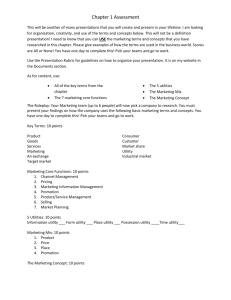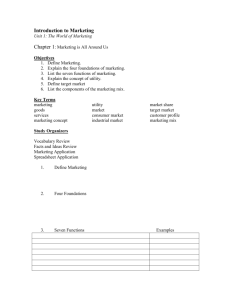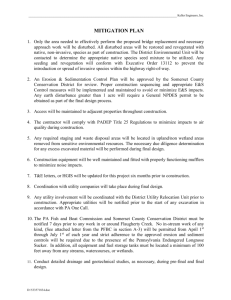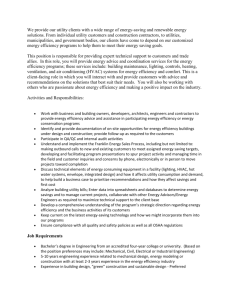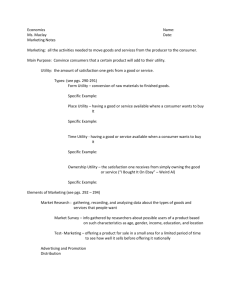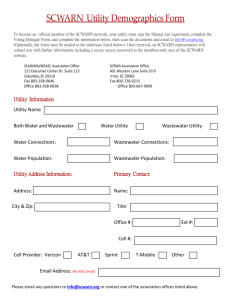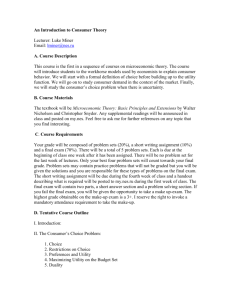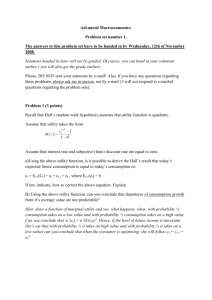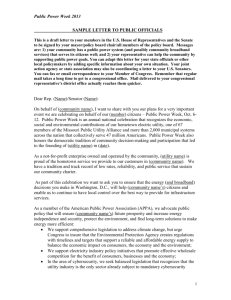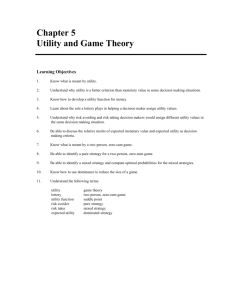Candace Chandra
advertisement
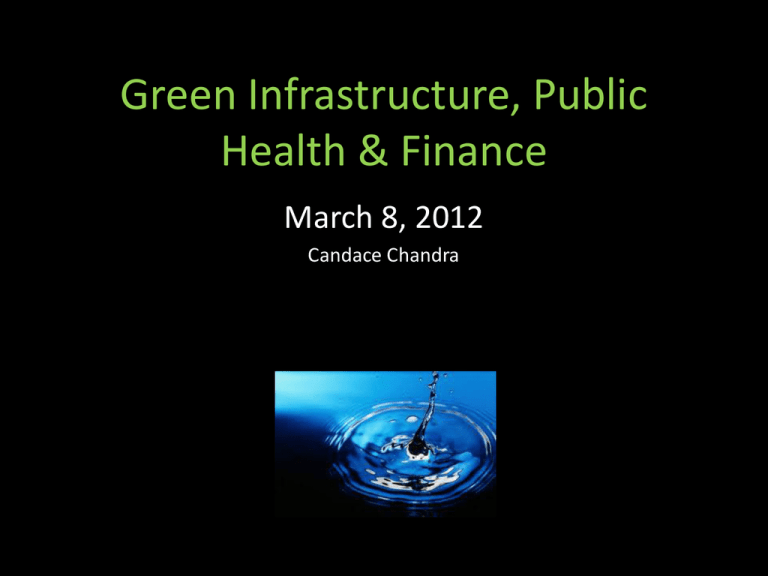
Green Infrastructure, Public Health & Finance March 8, 2012 Candace Chandra What is Green Infrastructure? Green infrastructure is strategically planned and managed networks of natural lands, working landscapes and other open spaces that conserve ecosystem values and functions and provide associated benefits to human populations. How Does Green Infrastructure Benefit the Environment? • Reduced and Delayed Stormwater Runoff Volumes • Enhanced Groundwater Recharge • Stormwater Pollutant Reductions • Reduced Sewer Overflow Events • Increased Carbon Sequestration • Urban Heat Island Mitigation and Reduced Energy Demands What is Missing? • Introductory video http://www.youtube.com/watch?v=5v53Dxmc5 Q0 How Does Green Infrastructure Benefit Public Health? • Improved Air and Water Quality • Additional Wildlife Habitat and Recreational Space • Redirection of toxins • Management of Infectious Species • Creation of Green Spaces for Food and Social Well-Being (nature deficit disorder-Richard Louv) What Does Green Infrastructure Look Like? Green infrastructure encompasses a wide variety of natural and restored native ecosystems and landscape features that make up a system of “hubs” and “links.” Hubs & Links Hubs • • • • Reserves Manage native landscapes Working lands-brownfields Regional parks and preserves • Lakes, aquifers, oceans • Urban areas • • • • • • Links Landscape linkages Conservation corridors Greenways and waterways Greenbelts Ecobelts Green roofs The 10 Green Sectors that are attracting investments • • • • • • • • • • Energy Efficiency Technologies Recycling technologies Green Building Materials Water Resources Conservation Natural Resource Banking Geothermal, Solar, Wind, Waste to Energy Cleantech Marketing Companies and Websites Watershed Investment Funds Environmental Services Utilities Impact of risks related to the waterfood-energy nexus (non exhaustive) Impacts Direct Impacts Indirect Impacts Impact on - Stagnation in economic development governments - Political Unrest - Cost of emergency food relief - Significantly reduced agricultural yields - Threats to energy security - Increased social cost linked to employment and income loss as agriculture is negatively effected - National security risks/ conflict over natural resources Impact on - Increased levels of hunger and society/popu poverty lations - Increased environmental degradation - Severe food and water shortages - Social unrest - Food price spikes - Migration pressures - Irreparably damaged water sources - Loss of livelihoods Impact on business - Lost investment opportunities - Export constraints - Increased resource prices - Commodity price volatility Infrastructure Stakeholders Involved in Green Infrastructure Infrastructure Protection Governance Planning Information Sharing Technology Federal Private Sector State & Local Government Continuity & Resilience Safety Protection & Response Business Continuity & Resilience Innovation and Quality Community Shareholder Value Waste to Energy http://www.youtube.com/watch?feature=player_embedded&list=PLBE4A8600907 17EB3&v=mOZKVPtuXWU How are we different? • We see wastewater as a resource than a liability • Focus on re-use of water at many different levels and not just clean drinking water Utility Enabled Financing and Repayment Model $$$$$ Customer wants to save money on utility bill As part of utility service, the meter is assigned a fixed monthly charge to pay off the upgrade Utility determines best upgrade package that can be financed out of projected savings Utility oversees efficiency upgrades at no upfront cost to customer Performance Metrics, not “maybes” can be written into a PPP contract as guarantees Customer Service • Customer satisfaction surveys • Incoming calls answered rates • Emergency response rate • Billing accuracy, meter reading Water Quality • Meet/exceed all water quality standards • Meet specific criteria for constituents in water • Reduce taste and odour issues • Volume and type of tests Source: Veolia Water Operations • SOPs, technical and process plans • Reliability centered maintainence • Main breaks • Hydrant repair Capital Projects • Execution of specified capital asset replacement and projects Investments stay local Community involvement • Specific programs and citizen advisory council How to Invest in Water: “The Great Untold Story” A crisis and an opportunity: http://finance.yahoo.com/blogs/breakout/inves ting-water-great-untold-story-173537241.html The Challenge for Public Health • Build public infrastructure with health at forefront • RETHINK the physical infrastructure (reference Rob Dunn’s book-UNC Chapel Hill) • Bring data to finance (both public and private) • Integrate with Natural Resource movement (see UNEP Finance Initiative) Videos • Practical application video - Smart Green Infrastructure: How To Grow Sustainable Cities http://www.youtube.com/watch?v=uGzbDmgQ HTo Contact Info AQEX LLC 2200 Pennsylvania Ave. NW, 4th Floor East Washington, DC 20037 Tel: 202-507-5710 Email: cchandra@aqexllc.com

